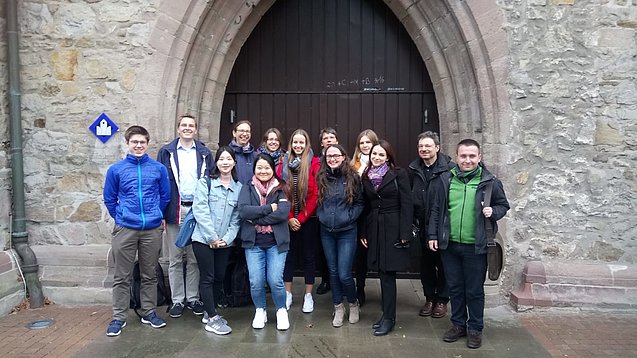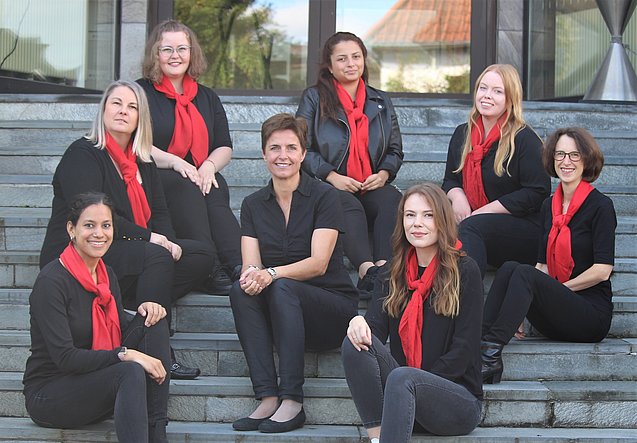Church music | Organ

Unfortunately, the overview is only available in German so far. Please consider the panel "Auf einen Blick" here.
The study of church music comprises regular tuition in organ, organ improvisation, choral and orchestral conducting, singing, piano and all the theological and liturgical subjects relevant for church work. Greater in-depth study of, or concentration on, major individual artistic subjects is possible independently of the study of church music, either building on it or taking other subjects parallel to it. Detmold University of Music has working partnerships with the University of Church Music of the Protestant Church of Westphalia at Herford and with the State Church of Lippe. Since 2010 Detmold University of Music has owned a symphonic organ built by Karl Schuke, with 61 stops and three manuals, in the Catholic Holy Cross Church in Detmold. There is a further large concert organ (Klais, IV/53) in the HfM concert hall. The organ in the chapel in the Palais (Sandtner, III/31) has a French romantic tone quality. In addition, there are two two-manual organs and a three-manual organ (Jann/Steinmann) available for practice purposes. Including the Oestreich organ (1795) in the Detmold Marktkirche (for which Brahms probably wrote both of his Preludes and Fugues), the pneumatic Ackermeier organ in Detmold Castle (1910), the Schwalbennest organ in the Kirche St. Marien Lemgo [Church of St Mary, Lemgo] (Slegel/R. West, 1613/2013) and the baroque organs at Borgentreich, Marienmünster and Melle, significant instruments from a broad stylistic palette are available in Detmold and the surrounding area. Master classes with prestigious visiting professors and organ study trips to outstanding instruments across the European organ landscape complement the training programme.
In the Musica Sacra concert series, students and tutors from the Church Music Department bring organ and choral concerts to Detmold and, indeed, to the whole of Westphalia and the Lippe area. They have been invited to take the entire spectrum of the church music repertoire – from early music right through to contemporary music – to Münster, the Hanseatic city of Lemgo and the monastery churches of eastern Westphalia. In order to give students practice in choral and orchestral conducting, each semester Detmold University of Music puts on a workshop concert. This gives church music students the opportunity to rehearse and perform oratorios and masses with choir and orchestra. HfM’s Chamber Choir offers specially gifted students opportunities to perform more exacting choral music, both in Germany and abroad, in the course of which the choir has won numerous prizes. HfM’s Baroque Academy is dedicated to the history of 18th century performance practice.
Unfortunately, official documents are only available in German so far. Please consider the panel "Studiengangsdokumente" here.
Winter semester
Bachelor/ Master: 15.02. - 15.03.
Summer semester
Bachelor/Master: 01.10. - 01.11.
Please apply to the Detmold University of Music via the online platform muvac.
- First of all, create your muvac candidate profile with as detailed information as possible.
- Then select the degree program you are interested in amongst the vacancies directly in muvac under Institutions – Hochschule für Musik Detmold. It is important that you upload your complete application documents and your video for the pre-selection (if required for your degree program). Check beforehand that your video meets all the requirements.
- A processing fee of 50.00 Euros will be charged for the application. Please note: a refund is not possible.
Important: Please check in your e-mails afterwards that you have received a confirmation e-mail. You will be informed about the status of your application via muvac.
The probable dates of the aptitude tests can be found here.
The following requirements must be met for the chosen study programme:
- evidence of the higher education entrance qualification
- successful completion of the aptitude test
- evidence of knowledge of German
- evidence of health insurance
- evidence of payment of the semester fee
| Preliminary round | No preliminary round |
| Audition | The audition for the study programme B.M. Church Music comprises the following parts: |
| Organ |
|
| Organ Improvisation/ Choral accompaniment | Harmonization of church hymns, as well as introductions and intonations, prepared as well as ad hoc. |
| Choral Conducting |
|
The compulsory subjects for the Bachelor programme Church music are the following:
Compulsory instrument piano:
Performance of three piano works or parts of works from different musical periods including contemporary music. Advanced skills are generally expected.
Compulsory subject voice:
Performance of a basso continuo song as well as a song from the Classical or Romantic period; in addition, sight-singing is required.
Music Theory:
Advanced knowledge of major-minor harmony, written test of up to 60 minutes duration: elaboration of a figured bass, a 2-part polyphonic and 4-part homophonic song or chorale movement. The written test is supplemented by an oral-practical test of 10-15 minutes on the piano with cadenza playing (including secondary functions and basic knowledge of modulation), continuo playing as well as harmonisations of the melodies or bass progressions presented. Example
Aural Skills:
Examination of giftedness and previous education. Written test of about 60 minutes duration: time signatures, rhythmisation of a tone sequence, interval and chord dictation, 2-part movement, melodic memory task, tone changes in free-tonal sounds, recognition of rhythmic and melodic errors. The written test will be supplemented by an oral-practical test of up to 15 minutes duration. Example
The Deutsche Tonkünstlerverband offers preparatory courses in music theory and ear training for the aptitude test in Detmold.
The following requirements must be met for the chosen study programme:
- evidence of the higher education entrance qualification
- successful completion of the aptitude test
- evidence of knowledge of German
- evidence of health insurance
- evidence of payment of the semester fee
| Preliminary round | No preliminary round |
| Audition | At least 30 minutes of music, only complete works, including:
|
The compulsory subjects for the Bachelor programme Freelance musician are the following:
- Compulsory subject piano: Performance of two easy piano pieces from different musical periods, e.g. J. S. Bach: Kleine Präludien; classical sonatinas; Schumann: Album für die Jugend; Bartók: Microcosmos III/IV.
- Music Theory: Demonstration of a command of "General Music Theory", basic knowledge of harmony. Written test of 60 minutes duration: notation, beat/rhythm, intervals, scales (incl. church modes), chord structure. Continuation of a given melody; elementary 2-part linear and 4-part homophonic song setting; (supplementary oral examination if necessary).Example
- Aural Skills: Examination of giftedness and previous education. Written test of about 60 minutes duration: time signatures, recognition of a melody, rhythmisation of a tone sequence, interval and chord dictation, simple 2-part movement, melodic memory task, recognition of rhythmic and melodic errors.Example
To prepare for the aptitude test in the subjects music theory and ear training, you can use our newly developed tutorials and exercises:
1. Register for free on detmoldmusictools.de
2. Select the course 003 aptitude test at HfM Detmold or use the following link: https://detmoldmusictools.de/index.php?cmd=courseManager&mod=course&action=show&courseId=362
The Deutsche Tonkünstlerverband offers preparatory courses in music theory and ear training for the aptitude test in Detmold.
The following requirements must be met for the chosen study programme:
- Bachelor degree or diploma in Church Music
- successful completion of the aptitude test
- evidence of knowledge of German
- evidence of health insurance
- evidence of payment of the semester fee
| Preliminary round | No preliminary round |
| Audition | The audition for the main instrument in the study programme M.M Church Music consists of the following sections: |
| Organ |
|
| Organ Improvisation/ Choral accompaniment |
|
| Choral conducting |
|
The compulsory subject for the Master programme Church Music contains:
- Compulsory subject piano: Performance of 2-3 works or movements of moderate difficulty from different musical periods. Possibly a light accompaniment to the literature of your main subject instrument.
The following requirements must be met for the chosen study programme:
- artistic or educational Bachelor's degree or diploma, final university examination if applicable, church music if applicable
- successful completion of the aptitude test
- aptitude test for specific electives if applicable
- evidence of knowledge of German
- evidence of health insurance
- evidence of payment of the semester fee
| Preliminary round | No preliminary round |
| Audition | At least 45 minutes of programme, including:
Criteria:
|
The following requirements must be met for the chosen study programme:
- artistic or educational Bachelor's degree or diploma, final university examination if applicable, church music if applicable
- successful completion of the aptitude test
- aptitude test for specific electives if applicable
- evidence of knowledge of German
- evidence of health insurance
- evidence of payment of the semester fee
| Preliminary round | No preliminary round |
| Audition | Programme of at least 45 minutes with challenging repertoire from different musical periods, as well as contemporary repertoire. Only complete works. Assessment criteria:
|
The compulsory subject for the Master programme Soloist (Organ) contains:
- Compulsory subject piano: Performance of 2-3 works or movements of medium difficulty from different musical periods.
The following requirements must be met for the chosen study programme:
- artistic or educational Bachelor's degree or diploma, final university examination if applicable, church music if applicable
- successful completion of the aptitude test
- aptitude test for specific electives if applicable
- evidence of knowledge of German
- evidence of health insurance
- evidence of payment of the semester fee
| Preliminary round | The audition programme is to be sent in advance by video of the applicants. For the video, the applicants make a representative selection of their programme of at least 15 minutes duration. |
| Audition | Programme of at least 45 minutes with challenging repertoire from different musical periods, as well as contemporary repertoire. Assessment criteria:
|
The following requirements must be met for the chosen study programme:
- successful completion of a Bachelor’s or Master's degree in artistic instrumental studies or singing or an equivalent diploma
- successful completion of the aptitude test
- evidence of health insurance
- evidence of payment of the semester fee
| Preliminary round | A video programme of minimum 30 minutes should be sent in advance for a pre-selection of applicants. |
| Audition | The 1st audition round consists of an artistic presentation by the applicant or the string quartet or piano trio in front of an expert commission. For this presentation, the expert commission selects circa 20 minutes from the 60-minute programme proposal. The expert commission decides on whether the applicant proceeds to the 2nd round. The 2nd audition round consists of an artistic presentation by the applicant or the string quartet or piano trio in front of a large, interdisciplinary commission. For this presentation, the commission selects circa 20 minutes from the 60-minute programme proposal. If an applicant is admitted to the audition according to § 2 Para. 2, the large, interdisciplinary commission may conduct a colloquium, the form and content of which are to be determined by the commission. In the subject Piano (Lied interpretation), the applicant brings his/her own singing partner to the audition. |

If you have any further questions, please don't hesitate to contact us. Please visit us at our opening hours or write a mail to the following address:























